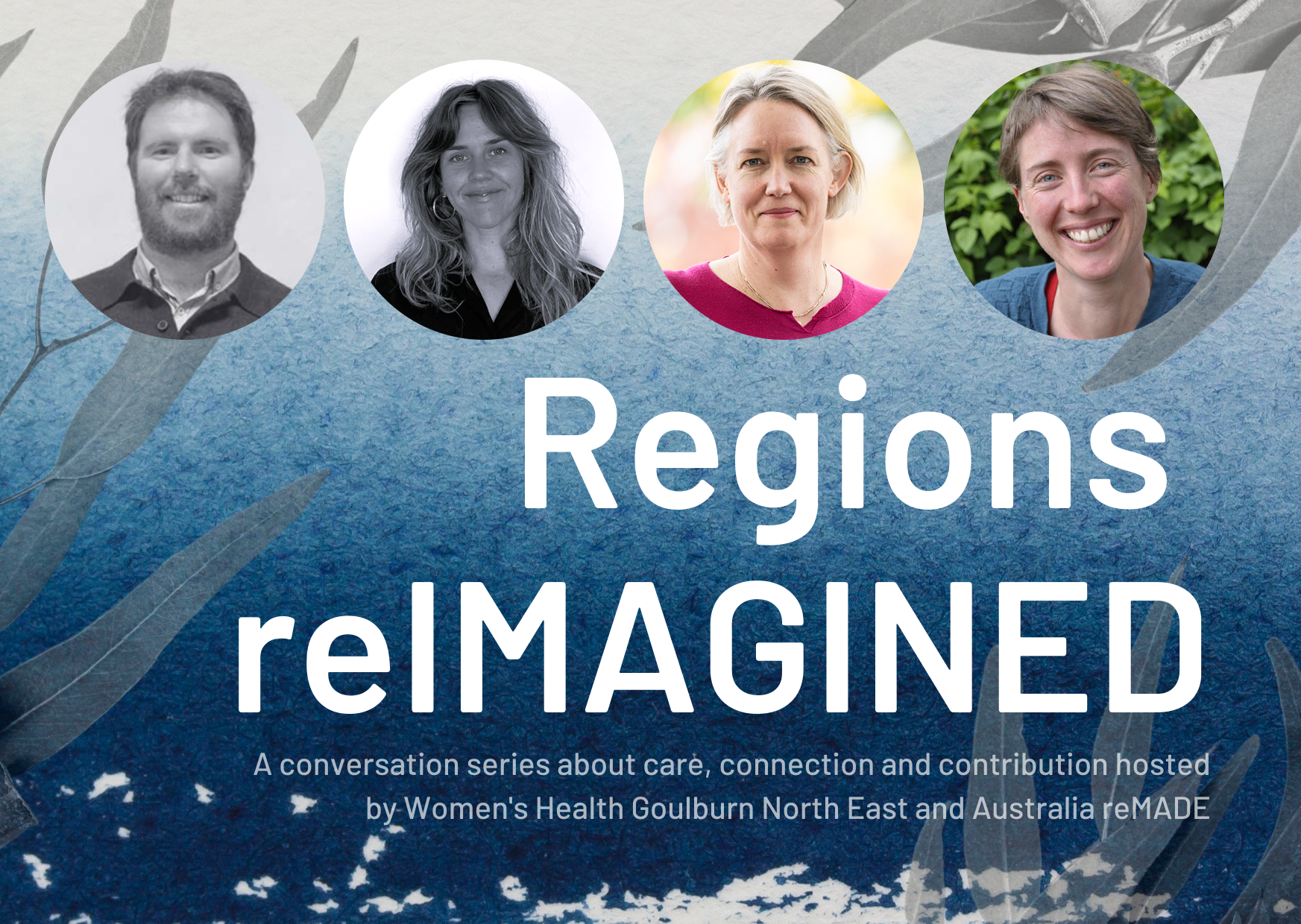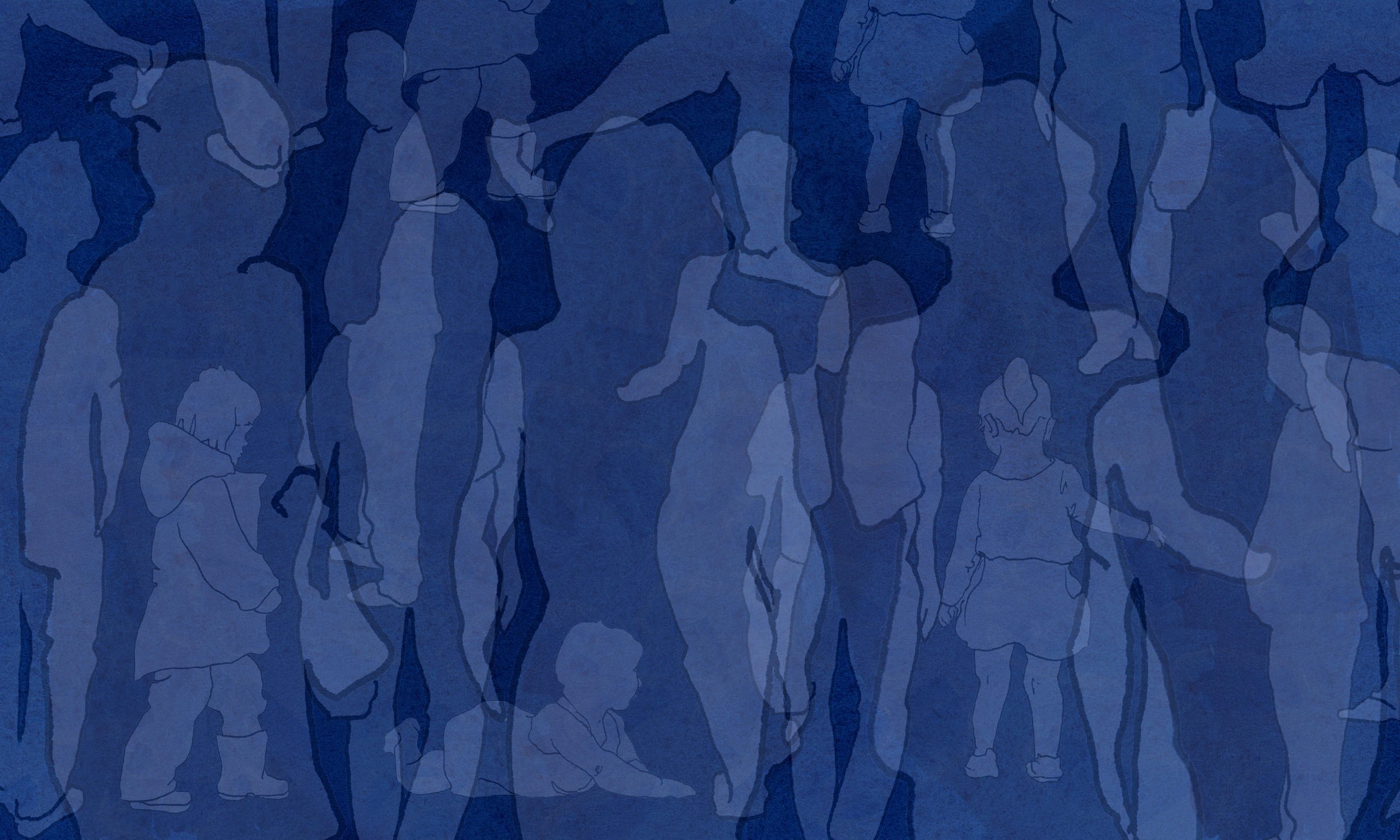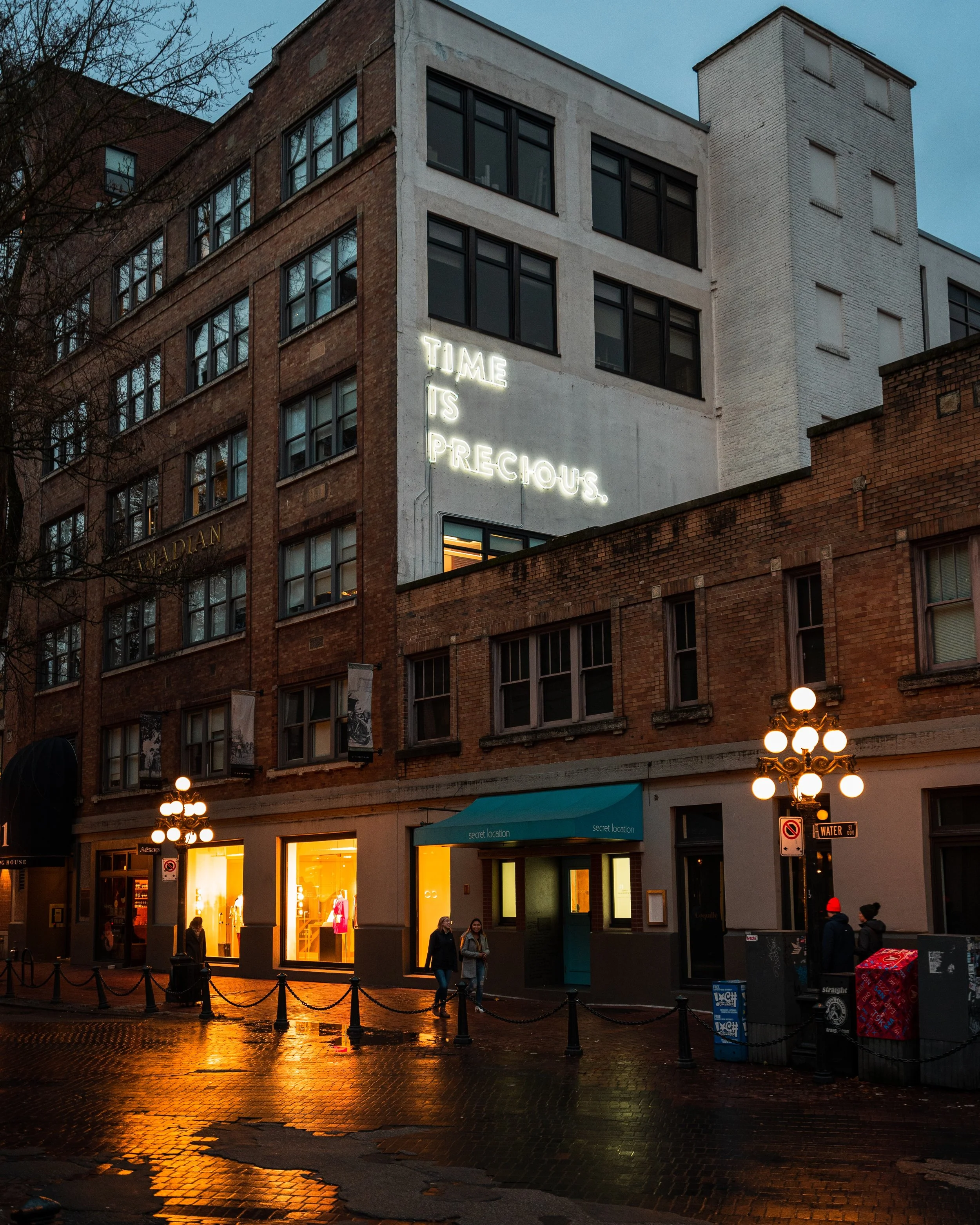Regions reIMAGINED: Caring for our communities
Do you ever meet people you wish you could just pop in your pocket and carry around with you? People who have wise things to say about the issues you care about and can articulate them in clear and accessible ways?
I had the pleasure of moderating a panel discussion with three such wonderful people:
Beth Thornber, a First Nations artist of the Wiradjuri people, whose art practice considers existing structures cemented in everyday life and applies this lens to reimagine ideas of sacredness, boundaries, common ownership and shared responsibility.
Dr Arnagretta Hunter, a physician and cardiologist concerned with the effects of climate change on human health. She is the chair of the Commission for the Human Future and a member of the ANU Institute for Climate, Energy and Disaster Solutions.
Matt Grogan, a commercial and property lawyer and a director and founder of community-energy company, Indigo Power Ltd and a founder of Totally Renewable Yackandandah.
Our recent research into the things that people want for themselves and their communities showed a big appetite for reimagining care. People want the ability to care and be cared for and could see the need for new ways of thinking about care.
With the amazing support of Women’s Health Goulburn North East we brought these three panellists together to talk about care. Specifically we wanted to explore questions like, ‘How do we value care and recognise how essential it is to our existence?’ And, ‘what sort of infrastructure do we need to put in place to care for each other and to be cared for?’
You can watch the full video of the event here, but for those of you who like a written summary I’ve pulled together some of my favourite points from the evening.
1. “Throw back the babies” and expand our boundaries of care
“Throw back the babies” (the small fish… so that folk downriver can also have some!)
What if we all just took what we needed and left the rest for others?
One of my favourite phrases from the evening came from the story Beth told of growing up on the Murray River and fishing with her Pop. She said he always told her to “throw back the babies” (the small fish, in case anyone here is confused!) so that folks downriver could also have some. What I particularly loved about Beth’s story was that she wasn’t taught to throw the fish back so that her family could eat tomorrow (although I am sure that was a part of it), but that she was specifically told to do it so that others who lived on the river could also eat. An act of care that goes beyond immediate family or community boundaries.
This recognition that we’re part of networks of care bigger than our immediate families raised some interesting discussion among the panellists about what it looks like to expand our responsibility to care beyond arbitrary boundaries.
Again Beth led us here, as she wondered why it is that a fence that designates a national park has such power to tell us what land to care for and what land is somehow less worthy.
Similarly, Matt talked about his job as a lawyer and how so often the perceived role of lawyers is to be an attack dog, attempting to get as much from the ‘other side’ as possible. Matt has a legal duty of care towards his clients, and he also recognises that he does this work in the context of a community. He knows that to some degree he has the power to help members of his community work through conflict – recognising that in small towns people will need to live with each other and the local context. So Matt has a wider definition of ‘duty of care’ that includes how the way he works impacts not just outcomes for his clients, but the community as a whole.
And as expected Arnagretta also had a perspective on an expanded definition of care. For her as a cardiologist and physician, expanding preventative healthcare to include the prevention of climate change and catastrophic risk is really a no-brainer. We know that there are significant health impacts of a warming climate, from increased deaths during heatwaves, to mental health impacts of disaster. Research shows that the flow on effects of the 2019/2020 bushfires saw increases in premature deaths, hospital admissions for cardiovascular diseases and respiratory diseases, and emergency department attendances for asthma. And we all know that we need a healthy planet to sustain human life! (For anyone interested, the Climate and Health Alliance is a great place to start connecting and learning about these issues.)
As a starting point, I really loved this invitation to think more deeply about expanding our boundaries of care. Care beyond just one’s own family, client or the patient sitting in front of you – to the wider community and ecosystem to which we all belong.
Think about how you can expand the boundaries of who and what you care for in your own life. Make a list and try one new practice.
What kind of infrastructure (policies, practices, programs, social norms, physical things) could help us expand who and what we care for as a society? What are we currently doing well, and what’s ripe for reinvention? Share an idea with your family, colleagues, boss, social media peers, local paper or MP.
2. #ValueCare as a policy choice, not just a personal problem
So we’ve decided to expand our boundaries of care. It’s empowering to think about what we can do as individuals – the agency we do have to care for people and place in new ways, and allow ourselves to be cared for, beyond arbitrary boundaries. But too often the conversation stops there, putting all the onus on individuals (especially women) to solve the care challenges in our lives and communities. We’re told solutions lie in better time management, lunchbox hacks and positive thinking. We give more of our own labour (mostly unpaid) or pay someone else to do it for us.
How do we begin to reframe and reclaim care as a collective priority, and make room for more creative collective solutions that truly #valuecare, and not just at the expense of some?
Arnagretta stepped in here with the observation that “policy is a choice”.
I love this because it reminds me that a lack of care or feeling constantly squeezed is perhaps not inevitable; and that if we, as a community, decide to centre care in our policy decisions – we actually can! The Albanese Government’s recent decision to increase national paid parental leave, including expanded ‘use-it-or-lose-it’ paid time at home for dads and partners, is a noteworthy example. And it’s worth remembering that our federal government (rightly, in my opinion) spends more money on our collective social security and welfare (including the aged pension, family tax benefits, child care subsidies, JobSeeker payments and the National Disability Insurance Scheme) than anything else. And it could spend more!
So why have we been trained to feel poor, especially when it comes to prioritising care?
After all, the decision to spend money on submarines instead of hospital beds is a policy choice. The decision to reduce staffing ratio requirements is a policy choice. The decision to prioritise fossil fuel donors over the health of people and planet is a policy choice. These types of decisions materially impact our ability to care and be cared for, and shape who we do and don’t consider worthy of our care.
So where to begin in our own lives, if we’re not a sitting MP with power to influence national policy? Arnagretta didn’t leave us hanging. Her approach is to centre care in as many of our conversations as possible (public and private), and to use the language of care in the work that we do, whatever it is. This helps to ensure that we’re linking issues and putting care at the centre of our decision making. If we’re not talking about it, it won’t be counted.
Using her favourite hashtag (#ValueCaring), Arnagretta encouraged everyone to constantly use the language of care in our workplaces. She laid down the challenge and asked people to see how many times they could get the phrase ‘value caring’ inserted into their work in one day. (WHGNE got to work immediately and the next day reported that they’d used the phrase at least seven times in one meeting! Anyone want to try and outdo them? Tell us how you go in the comments.)
Remember that valuing care is a choice, not just in our personal lives but in the policies we have at work and from our government. Encourage your employer, staff, colleagues and elected representatives to value caring with actions, setting visible norms and proactive policy choices – not just words. Share your successes and brag about your boss/benefits/wins to help inspire others, raise the bar and create new social norms!
How many times can you insert #ValueCaring into your work today? Let us know how you go in the comments. And if you need help working out how to insert the language of care into your work, check out our public good report and messaging guide.
3. Recognise time as essential care infrastructure
In our work on the public good and in every conversation I’ve ever had on care, the issue of time is pretty well unavoidable. People want to care about democracy but can’t attend a council meeting because they have to get their kids to bed/clean the house/look after their elderly parent/actually get some sleep. People want to care about those downriver, but frankly are worried that if they don’t grab everything they can they won’t have enough.
So while there are many policy decisions that impact our ability to care, (eg staffing ratios, universal paid sick leave, paid parental leave, job security, universal free healthcare, social safety nets, universal education, etc etc), one of Matt’s favourite solutions when it comes to creating more time for care is the elegantly simple four-day work week.
Matt explains how the four day work week is a policy setting that can provide people with more time to care for their families, communities and places. Care work obviously can mean many things. In Matt’s life it’s the work he does for a living, but it’s also his work as a parent and the time he spends contributing to local climate resilience projects (such as Totally Renewable Yackandandah).
Matt’s suggestion for a four day work week was pretty popular with people who attended the discussion and globally it’s an idea that’s getting a lot of traction. If you’re interested, the University of New South Wales has an easy-to-read round up of trials (including what it means for Australia) and the global advocacy group 4 Day Week has some interesting resources. For the companies trialling it, reports repeatedly come back of happy, loyal staff who are productive during their work time because they have more time for the rest of their lives. And advocates say it would be a win for gender equality, emissions reductions and tourism as well.
Take some time to see which politicians, businesses and advocates are supportive of a four day work week and similar infrastructure. Take the time to give them a call, write to them, join their campaign or offer your support in other ways
Think about other solutions that free up our time collectively. For example, so many more organisations are allowing staff to permanently work from home or in hybrid office arrangements since the pandemic, saving not only on commute times but allowing those who can work remotely to move to less expensive regions and carry on with their careers. Let’s celebrate these wins (while not being afraid to discuss the trade-offs and complexities) as we dare to re-imagine our new normal.
There was so much more in this conversation that I want to revisit (hence the need to pop these wonderful people in my pocket). We also talked about ‘care as the safety to fail’ (knowing that someone has your back gives you the courage to try things differently) and ‘trust as the proven track record of care’ (trust is the result of caring for one another, an interesting point to ponder as many liberal democracies try to counteract polarisation and lack of trust).
My key takeaways from this conversation are expanding our boundaries of care, inserting care into our everyday work and conversations, reframing care from a private challenge to collective opportunity, and championing collective solutions that give us more time.
We are more than capable of creating infrastructure to help us to better care collectively, just as we prioritise care in our private lives. It’s about values and imagination, courage and choice.
MILLIE ROONEY
Millie is the National Coordinator for Australia reMADE. Millie has a qualitative research background and has spoken in-depth with hundreds of Australian's about their lives, communities and dreams. Millie is also a carer for her family and community and is passionate about acknowledging this work as a valid, valuable and legitimate use of her time.
Selected Other blogs by Millie:
That would be freedom
What are universities for?
Forget GDP, we need a bold new ‘why’ fit for the times we live in
Bread and Roses






